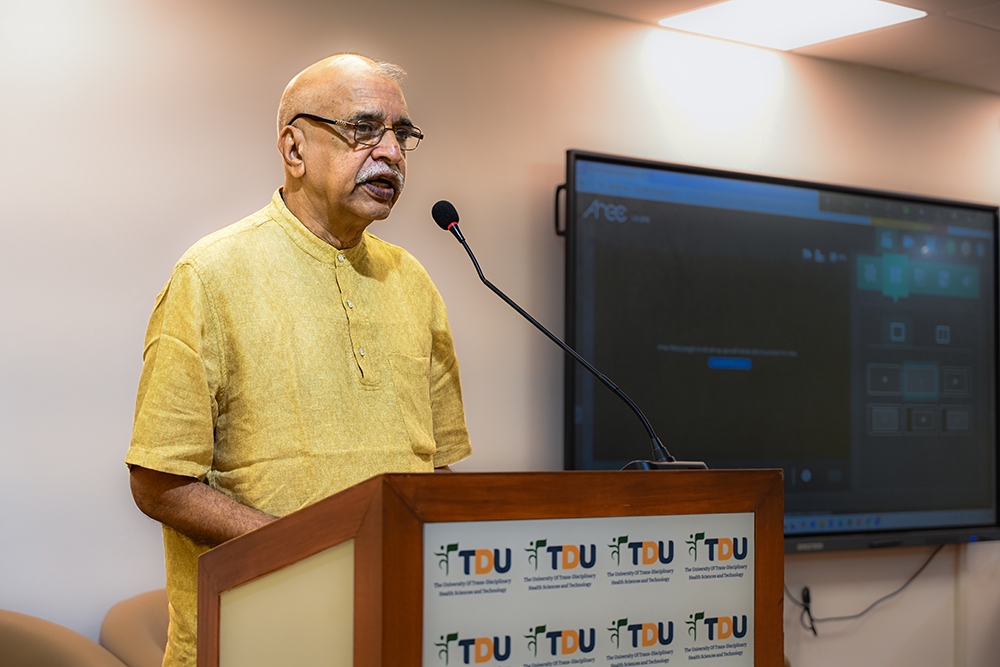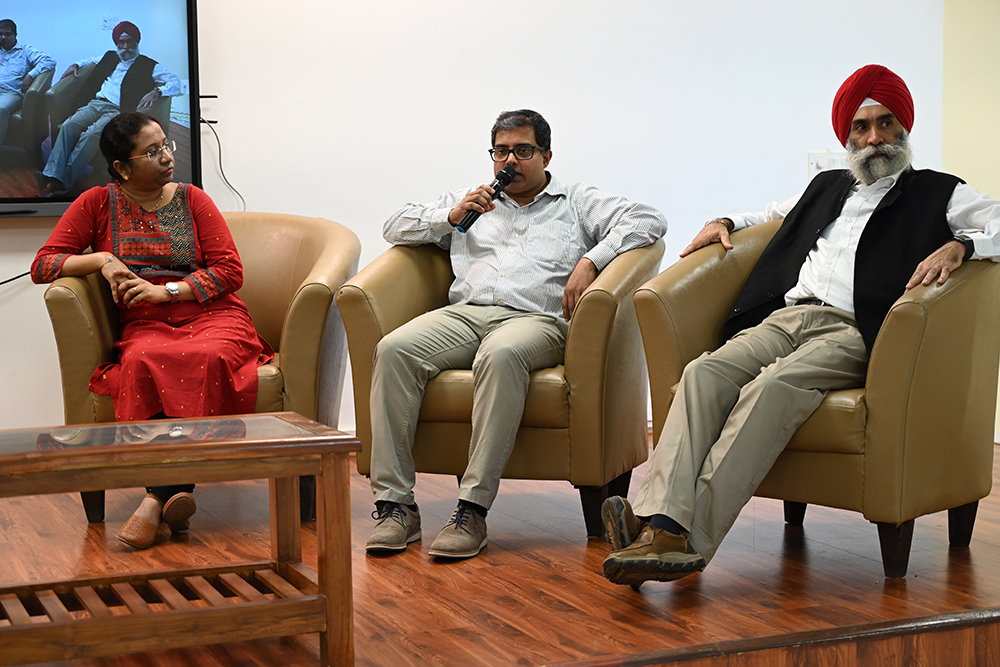
On 24 June 2025, NRI and the Food Futures Programme at the University of Trans-Disciplinary Health Sciences and Technology (TDU) co-hosted a dynamic international symposium in Bangalore, India. The event brought together over 150 researchers, policymakers, civil society actors, and students to explore food-first solutions that address the interconnected challenges of nutrition, livelihoods, and environmental sustainability.
Titled “Food Systems, Biodiversity and Nutrition: Linking Environment, Economy, Employment and Policy for Human, Community and Planetary Health”, the one-day symposium underscored the need for an urgent transformation of our food systems to protect both human health and the environment, while creating sustainable livelihood opportunities.
A shared vision for food systems transformation
Talks spanned themes including food biodiversity, local health traditions, public policy, and innovative agricultural technologies. Prof Darshan Shankar, Vice Chancellor, TDU offered insights into revitalising India’s rich heritage of local health traditions through research, education and outreach. Keynote speaker Prof Trilochan Sastry reflected on decades of experience in cooperative development and discussed the key role of cooperatives in building food systems that elevate farmer livelihoods.
In her remarks, Prof Sheryl Hendriks, Director of NRI, discussed options for the future of food systems and emphasised the importance of integrated, cross-sectoral approaches and stakeholder accountability in transforming food systems. ‘Not enough has been done to define what the desired food system should look like and what roles each actor should play,’ she said. ‘Ensuring fairer, sustainable and healthy food systems will require a shift to systemic accountability, and enabling, comprehensive policies.’
NRI expertise and global collaboration
NRI staff contributed across several sessions, highlighting our interdisciplinary research and long-standing collaborations across the world. Prof Maruthi Gowda presented a case study of the Virtigation Project, a multi-national effort developing solutions to emerging viral diseases in tomatoes and cucurbits in Europe, the Mediterranean and India.
Prof Nazanin Zand, Head of NRI’s Food and Markets Department, delivered a talk on future trends in the food and drink sector, while Dr Parag Acharya joined a lively panel discussion on the role of alternative proteins in sustainable diets.
Prof Zand also re-echoed the importance of collaboration in transforming food systems. ‘Only by working collaboratively and across disciplines can we unlock innovation and ensure that every dollar invested in research and development delivers on our objectives for food systems transformation,’ she noted.
The panel, which included representatives from the Good Food Institute India and the Akshaya Patra Foundation, sparked an engaging debate on the cultural, nutritional, and economic dimensions of food innovation in a globalised world.

Dr Parag Acharya, Senior Fellow in Food Innovation at NRI, highlighted the importance of alternative proteins in unlocking new value chains that support people and the planet. ‘Alternative proteins have the potential to reduce the environmental footprint of agriculture and create significant value for a large legume producer like India,’ he remarked. He also allayed fears that the alternative protein industry aims to replace conventional protein. ‘We want to have a practical balance of alternative protein and mainstream animal protein. It’s a case of complementarity, not competition,’ he emphasised.
An engaging symposium
Complementing the formal programme were a series of hands-on and experiential opportunities for interaction. Participants joined guided tours of medicinal and wild edible plant gardens, and the alternative protein product development ‘kitchen’ at TDU, and explored the University’s digital databases on medicinal plants and foods. A student poster session provided a platform for emerging researchers to showcase work spanning plant-based alternative protein research, nutrition, processing and value addition to Indian indigenous foods.
These elements brought the day’s themes to life, fostering cross-disciplinary dialogue between academia, practitioners and community members.
A Platform for Future Partnerships
Throughout the day, the value of collaboration and co-creation was clear. NRI’s engagement with TDU reflects a shared commitment to developing inclusive and evidence-based responses to food systems challenges, leveraging both scientific research and indigenous knowledge systems.
‘This symposium marks an important first step in our relationship with TDU,” said Prof Hendriks. “We’re excited to develop joint initiatives that place food at the centre of health, sustainability, and livelihoods.’
As the world navigates growing climate and nutrition challenges, the insights and relationships sparked at this symposium provide a solid foundation for continued cooperation. The event reaffirmed that food systems, when grounded in innovation, biodiversity and equity, can be powerful levers to improve livelihoods worldwide.

